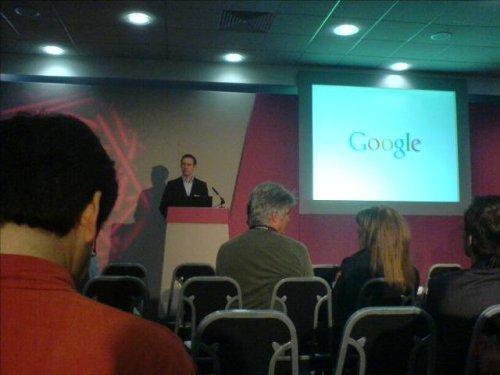
Re: today’s announcement about Google and Sony. It doesn’t appear to be a deal as such, but what’s clear is that half a million scanned books from Google Book Search will be made available as epub files, with millions more to come. Epubs. Ebooks.
Now, cast your mind back, if you will, to the London Book Fair 2007. I was there, twittering and liveblogging away. There were zombies and some book no one had heard of called White Tiger. All very good.
I went to a quite interesting Google presentation, on Google Book Search. Lots of publishers were very nervous about GBS, and Google, with the help of panellists from Berg, Springer and the Cambridge University Press, did a very good job of reassuring them. A lot of publishers went away reassured about Google’s aims and intentions, and no doubt signed up to GBS some time later.
A few weeks later I wrote a piece about this, and raised some questions. I was a bit doubtful when they assured publishers of their good, simple intentions, and felt they were taking advantage of publishers’ (then) fairly minimal comprehension of ebooks and the web. It was reposted at Teleread. Here’s the key quote:
This dilemma increases when you hear what Google are saying about the status of these files. Emphatically they state, and I’m directly quoting Google’s Jason Hanley (Strategic Partner Development Manager) here: “Google Book Search is not an ebook”.
Well, isn’t that interesting. As I said at the time:
This isn’t contrariness. I want digitisation to succeed, but I’ve got some worries about GBS, based on two main observations: Google Book Search isn’t the same as Google Web Search, and Google, if not actually, intentionally lying, is certainly wilfully misleading publishers about its intentions.
The first part of that statement has become obvious with time, although it was all a bit more confusing two years ago. The second part, well. Hello Google ePubs. Surprise!
I could rant on about this for ages, but the core point is simple: Google is not just a search engine, it’s a publisher. Every time I try to defend them, they do something like this, and pretty much justify all those people who want to sue them for copyright infringement for making a “copy” of their website in their index. Start thinking about that.

No real need to see purposeful deceit or lies: any company would leverage their terms of use at some stage, given the opportunity. Doing otherwise would be unprofessional, a kind of betrayal of shareholders.
“Ne eos inducatis in temptationem” ?
Comment by Alain Pierrot — March 20, 2009 @ 8:36 am
Alain, I agree in principle, but I’m afraid that “seeing lies” is pretty much unavoidable. It doesn’t surprise or horrify or distress me, but telling people with a straight face that something has nothing to do with ebooks, then doing ebooks within two years, is definitely lying. Google is too big and clever to pretend they never thought about this, and they deliberately attempted to mislead publishers. However, if publishers were mislead, I’m happy to agree that it was pretty much their fault, and not Google’s.
Comment by James Bridle — April 2, 2009 @ 7:46 pm